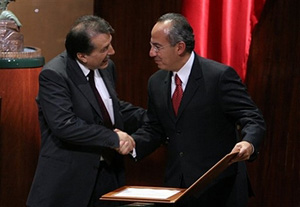 |
 |
 |
 Editorials | At Issue | September 2006 Editorials | At Issue | September 2006  
Calderón Must Undo Damage, Experts Say
 S. Lynne Walker - Copley News S. Lynne Walker - Copley News


| | Mexico's President-elect Felipe Calderon, right, receives from Chief Magistrate Leonel Castillo a document issued by the Federal Electoral Tribunal, TRIFE, that proves he won the majority of votes in the July 2 presidential elections in Mexico City, Wednesday Sept. 6, 2006. (AP/Alexandre Meneghini) |
Mexicans know the name of their next president: Felipe Calderón.

But with defeated candidate Andrés Manuel López Obrador vowing to set up a parallel government and declare himself president, many people wonder whether Calderón has the skills to govern his chaotic nation.

The 44-year-old Harvard-educated attorney is inheriting a country steeped in crisis – a crisis that political analysts say Calderón and President Vicente Fox helped provoke and must now try to repair.

With just 12 weeks remaining before his Dec. 1 inauguration, Calderón's challenge is somehow to persuade bitter adversaries who believe he stole the election that they can work together for the next six years.

Calderón, who promised during his campaign to wield a “hard hand” against lawbreakers, has to convince supporters and legislators in López Obrador's Democratic Revolution Party, or PRD, that he is genuinely sympathetic to their concerns.

He must find a way to end the rancor of the campaign, when he called López Obrador a “liar” and a “danger to Mexico.”

“He has to moderate his speech,” said analyst José Antonio Crespo. “He has to try to understand the damage done by this election. If he doesn't, he will not be able to build the bridges of dialogue he needs to govern.”

That Calderón won only 35.71 percent of the vote underscores the difficulty he faces as Mexico's next president.

“He comes in without a mandate and he comes in after this split has formed between the classes,” said analyst Federico Estévez. “That makes it very difficult to get a broad consensus.”

Calderón acknowledged those deep divisions last night when the Federal Electoral Tribunal presented him with a document officially declaring him Mexico's next president.

“My commitment is and will be during all of the days of my administration to look for dialogue that resolves differences – to lead a phase of conciliation between Mexicans,” Calderón said during the ceremony in the tribunal's courtroom.

But when Calderón stopped speaking and the applause fell silent, the specter of unrest still loomed a few miles away.

López Obrador's supporters, who for the past two months have camped along the elegant Reforma boulevard, vow to confront the army by blocking the annual armed forces parade during the Sept. 16 Independence Day celebration.

PRD legislators also say they will prevent Calderón from attending his own inauguration in Mexico's Congress.

Calderón not only faces López Obrador's efforts to make Mexico ungovernable. He must also confront divisions within his own party and pressure from fellow conservatives to take a hard line with political opponents.

Even though Calderón campaigned on job creation through free trade, foreign investment and tourism, analysts expect him to submit reforms to the newly inaugurated Congress that adopt some of López Obrador's campaign promises to the country's 50 million poor.

With Calderón's National Action Party holding 206 of the 500 congressional seats, Calderón has already begun to seek out alliances with other parties on long-delayed reforms.

“I think this Congress is going to get some social programs passed to undercut López Obrador,” said George Grayson, a Mexico scholar at the College of William & Mary.

If Calderón succeeds in pushing through a social package, “he will achieve some confidence building,” Grayson said. “If he starts with something that brings people together, he may be able to create an environment where he can move on to more controversial issues.” | 
 | |
 |



